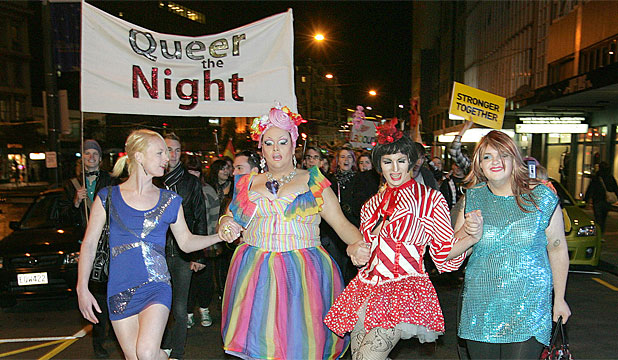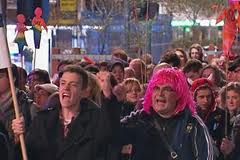
The following interview is with Kassie Hartendorp (Wellington Workers Party branch organiser and Schools Out facilitator and chair of Queer Avengers). And Jason Frock (Wellington Workers Party branch education officer, Schools Out facilitator, and trainee-coordinator of the Wellington Gay Welfare Group and member of the Queer Avengers). Both have been in highly involved in the recent Queer the Night demonstration and in the formation of the Queer Avengers campaign organisation.
The Spark: What was Queer the Night?
KH: Queer the Night was a march organised in response to the day-to-day violence that members of the queer community face while in the streets. The fear of verbal insults and physical attacks is something queers constantly carry with them everywhere.
JF: The streets are especially dangerous places for queers. Twice as much near bars at night which are highly sexualised areas where concepts of ‘masculinity’ need to be protected. They are often impossible to pass without having aninsulthurled your way if you’re visibly gay. It was also becoming normalised in Wellington to have regular queer bashings. Within our own friend networks it was becoming roughly 1 every other month.
KH: The purpose of the march was to call-out the queer community for its general silence towards the pervasive homophobic and transphobic street culture. We wanted people to realise that “enough is enough” and to begin to think about how to collectively organise beyond the march itself and to actually fight our continued oppression.
JF:Homophobic and transphobic violence is something experienced by queer community as a whole, but the responses to it are generally acted upon at an individual level. We wanted to break that atomisation by having a visible, militantand proud march through the centre of town and opening up a place where queers can come together and talk about our social oppression.
KH: What we needed was a celebration, a big bang to break the silence. We needed a powerful event which could break through the general apathy towards collective action. We needed an event which would empower people to take ownership of the queer community.
The Spark: How did the march itself go?
JF and KH: Overwhelming success.
 KH: The energy was amazing. For many of us it was the most militant march we’ve been on. There was a good turnout, of about 400 people. The militancy, size and feelwere much greater than the numbers. I’ve been on bigger marches that weren’t nearly as powerful. There were four official guest speakers; all were received well by the crowd. It was a very emotional and raw event. People were crying. Actually making the streets a queer space was a very powerful experience for people.
KH: The energy was amazing. For many of us it was the most militant march we’ve been on. There was a good turnout, of about 400 people. The militancy, size and feelwere much greater than the numbers. I’ve been on bigger marches that weren’t nearly as powerful. There were four official guest speakers; all were received well by the crowd. It was a very emotional and raw event. People were crying. Actually making the streets a queer space was a very powerful experience for people.
JF: For most young queers their first “mass queer space” is a nightclub. I went to my first gay nightclub at 17 and emotionally I was left reeling for days after the experience. It was the first time I ever really understood myself and my sexuality and realised I wasn’t alone. For a lot of the Schools Out youth Kassie and I work closely with, it was their first mass queer experience. It led to some very personal and passionate speeches during the open-mic session. For older queers, I think re-claiming a space that they usually associate with fear opened up many emotional outlets.
KH: It was a very politicising event, very successful in terms of empowering people to take ownership and action. For socialists it is important for us to fight the structural battle against queer oppression rather than fighting for a privileged position for any faction of queersvis-à-vis another, such as gays or lesbians over transpeople or bisexuals. That means using queer (different) to challenge the structural concept of ‘normal’, rather than just saying that gays or lesbians are ‘normal’ in the same way as heterosexuals are, which naturally infers another set of ‘outsiders’. And in that sense we were also quite successful in building a pretty inclusive event. Two of the four speakers either were intersex or trans and the other two were gay. We also had a good gender balance between the voices. However, we found it difficult to getting intoTakatāpui networks which is a problem we have to work out going forward. All the speakers had a good class understanding too which kept the content relevant.
 JF: In some ways Queer the Night was actually too successful an event! There’s a running joke going on now about the queer youth we work with in Schools Out getting ahead of us and revolting. Just one example of this, the whole situation where the youth called-up St Pats [Catholic secondary boysschool] on their discriminatory ball policy was an outcome of the immediate empowerment and ownership that came out of Queer the Night. Fortunately that empowerment was rather wide-spread and flowed into the public meeting the next week where 87 people, all active and with something to say met to plan what comes next.
JF: In some ways Queer the Night was actually too successful an event! There’s a running joke going on now about the queer youth we work with in Schools Out getting ahead of us and revolting. Just one example of this, the whole situation where the youth called-up St Pats [Catholic secondary boysschool] on their discriminatory ball policy was an outcome of the immediate empowerment and ownership that came out of Queer the Night. Fortunately that empowerment was rather wide-spread and flowed into the public meeting the next week where 87 people, all active and with something to say met to plan what comes next.
The Spark: Where has the focus/energy gone now?
KH: We made it clear on the night, that no matter how powerful people felt on the march, the next morning everything would still be the same. We made sure to organise and plan for the longer-term development of a political organisation the likes of which hasn’t been seen since the Gay Task Force in 86.
JF and KH: We’ve had a series of at least 10weekly public meetings now which on the 8th of July,a day before the 25th anniversary of the homosexual law reform bill being passed,culminated in the Queer Avengers being formed.
 JF: We’ve got our website online now at thequeeravengers.org.nz. Largely we’re operating on the same premise as Queer the Night, that is, that everyone has the right to express and explore their queerness without barriers—whether they be economic, religious or legal in nature. However, we are also a very democratic group and so naturally the Queer Avengers, which has a much greater community involvement, has become far more than Queer the Night ever was. We’re still working on our programme, but we’ve pretty much got our first campaign worked out which we will be launching with a demonstration on Thursday the 6th of October.
JF: We’ve got our website online now at thequeeravengers.org.nz. Largely we’re operating on the same premise as Queer the Night, that is, that everyone has the right to express and explore their queerness without barriers—whether they be economic, religious or legal in nature. However, we are also a very democratic group and so naturally the Queer Avengers, which has a much greater community involvement, has become far more than Queer the Night ever was. We’re still working on our programme, but we’ve pretty much got our first campaign worked out which we will be launching with a demonstration on Thursday the 6th of October.
KH: We’ve decided that we are a political action group dedicated to elimination all social forms of homophobia and transphobia. Under this lofty goal we have a series of 3 main campaigns which we intend to focus on, but we also want to have the flexibility to react to new issues which may arise.
Our three campaign areas are looking to be:
1) A queer youth campaign. Queer youth tend to be the most isolated populations in our community with the highest levels of loneliness, depression and suicidality. Most queer youth manage to make some connections with the community and can ward off that loneliness, however Auckland University’s 2007 Youth Report note that 39% seriously consider suicide as an option with 20% actually making an attempt, compared to 4% for straight youth. The statistics for trans youth are even worse. However, we know those statistics drop significantly when they have safe, queer spaces where they can meet each other and build friendships with other queers. Amongst other things we demand that the Ministry of Education take its legal obligation to make schools safe places by ensuring the resources are made available to the queer community to develop Queer-Straight Alliances in all schools throughout the country.
2) Our second campaign is going to be around supporting the older queer population. The institutions for older queersare just not up to the task. Some of the worst places in society to be queer either as a worker or as a resident is in rest-homes.
3) Our third campaign will be focused on gender and the discrimination that intersex, trans and genderqueerpeople face. We’re looking at number of options for getting it publicised that gender doesn’t necessarily follow from sex and that gender is also not just a binary.
The Spark/Ed Note: The Queer Avengers meets every Thursday at 7:00pm in Wellington at Anvil House, 138-140 Wakefield St. All meetings are public and new voices are always encouraged.
The views expressed in this interview are personal and do not necessarily represent the established views of each of the organisations.

Just another WordPress site